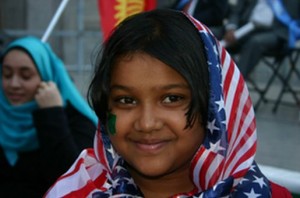Understanding Islam in America
What does it mean to be Muslim in America? That was the question posed at a recent symposium here in the nation’s capital hosted by Georgetown University and On Faith, an interactive conversation on religion sponsored by Newsweek magazine and The Washington Post newspaper.
Muslims in America are a microcosm of Muslims around the world. They come from more than 60 nations in Africa, Asia, Europe and the Middle East, as well as the United States. For both immigrants and American converts, formulating a sense of identity is crucial.
Muslim Americans often struggle with what it means to be Muslim in the United States, especially after September 11, 2001. For many, the terrorist attacks created a fear of Islam among non-Muslim Americans.
Washington Post reporter Sally Quinn, one of the panel’s moderators, says she has encountered many misconceptions about Islam in America. “I began to see how difficult it is to be a Muslim in this world, particularly to be a Muslim in the United States because I know that what we see in the papers and the actions of the few do not represent the tenets of the Muslim faith. There are still a lot of negative perceptions there,” says Quinn.
Quinn says these misperceptions arise because most Americans know very little about Islam. While there are more than seven-million Muslim Americans scattered throughout the United States, many Americans do not understand the basic principles Islam. According to many experts, there is often public concern that the religion promotes violence.
Hadia Mubarak, a senior researcher at Georgetown University’s Center for Muslim-Christian Understanding, says a confusing mix of political and religious conflict has fostered this misconception.
“I think the problem is that people are looking at the current tension between the U.S. and the Muslim world through the lens or the prism of religion when it really has nothing to do with Islam whatsoever,” says Mubarak. “You know there are certain political, socio-economic grievances, and historical grievances from the history of colonization, in much of the Muslim world that is really fueling a lot of the current tension. And it really has nothing to do with religion.”
Mubarak adds that while many people blame Islam for the violence committed by extremists, there is nothing about the religion, she says, that makes it incompatible with democracy, human rights, freedom, justice and gender equality.
Educating the U.S. Public
Interfaith organizations are trying to find a common ground between Islam, Christianity and Judaism. American Muslim organizations are focusing on educating the public about Islam and distributing free copies of the Koran in English.
But Ingrid Mattson, a professor of Islamic studies at Hartford Seminary in Connecticut, says sensational media coverage that dwells on Muslim violence fuels anti-Muslim sentiment in America.
“The media need to represent Muslims better to clarify the reality of the position that those people who are extremists, who are doing acts of violence, are marginal. I am not saying do not report the news. We need to know what is going on; we need to know when there is conflict and when there is war,” says Mattson. “But we also need to have the American people understand that these are not the majority of Muslims, that, in fact, the first targets of extremists are other Muslims. So Islam is not to blame.”
Many analysts say the media can help Americans distinguish between mainstream Islam and what is simply a politicized or militant movement that uses Islam for its purposes.
Hartford Seminary’s Ingrid Mattson, who is also President of the Islamic Society of America, says her organization is doing its part to educate the public. “We are working hard and we are fortunate in having so many partners, especially in the interfaith community — Christian organizations, Jewish organizations — interfaith organizations, who want to help us by educating their members to understand Muslims and Islam, and not be intolerant toward us,” says Mattson.
To help spread that message, Muslim American businessmen have launched Bridges TV — a 24-hour cable channel to explain Islam and help educate the U.S. public about their Muslim neighbors.
Imam Yahya Hendi, a Muslim chaplain at Georgetown University says that American Muslims should also assert themselves as an integral part of U.S. society. “For me it is not Muslims in America, it is Muslim Americans,” says Hendi. “We are here to stay. We are seven-million Muslim Americans and this our country. So for me, what does it mean to be Muslim American? It is to be loyal to our country, America, to our values as Americans, but also to be loyal to our values of Islam.”
Strengthening U.S.-Muslim Understanding
Many analysts point out that the more the American public learns about Islam, the more comfortable they’ll be with Muslim Americans as a part of society.
“I was born and raised here,” says Georgetown University researcher, Hadia Mubarak. “And I think we as Americans really need to ask ourselves, ‘What is merican culture?’ We need to realize that it is an evolving culture. It is a culture that is formed by the various ethnicities and religions that are part of the American fabric. And Muslims are just one part of that. The fact that I cover my hair does not make me any less of an American than anyone else.”
That is the essential message of the Georgetown University symposium on what it means to be a Muslim in America. In part, it means reassuring non-Muslims that while they may practice a faith different from most people in the U.S., they are just like other Americans who cherish family values and who appreciate the nation’s principles of freedom and democracy.


















